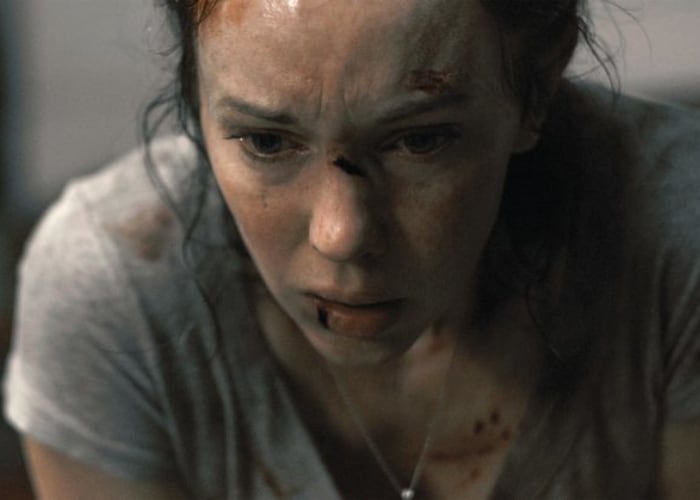There’s an entire sub-genre of slow-burn thrillers centered on everyday people forced by circumstance into a life and death world previously unknown to them. More specifically, the films are about a “good” person” who makes a choice — out of anger, greed, foolishness — that sets in motion a bloody chain of events requiring actions and reactions well beyond their wheelhouse. Two of the best in recent years are Blue Ruin (2013) and Bad Day for the Cut (2017), but in addition to being tales fueled by vengeance they’re also ones about men. Director/co-writer Matthew Pope‘s feature debut, Blood On Her Name, goes counter to both as it focuses instead on a woman simply struggling to do right by her family, but as a tension-filled and devastating look at the inevitability of consequence it absolutely belongs in the same conversation.
Leigh (Bethany Anne Lind) stands over a dead body in the garage she owns. Blood pools from the dead man’s head, and while she comes close to calling the police, her fingers hesitate over the phone. Her teenage son Ryan (Jared Ivers) sits afraid and shaken in another room, and with worries about him, painful memories about her own father (Will Patton), and the fate of her already struggling business swirling in her head, she decides instead to dispose of the body. It’s a decision born from desperation, and it’s one complicated by her own morality — the dead man has a family of his own, and not wanting to leave them trapped in a purgatory of not knowing what happened to him, she instead returns the body to their shed for them to find. No good deed, as they say.
Blood On Her Name wisely drops viewers right at the moment of emotional conflict — the dead man, and the choice that will haunt what follows. Leigh’s problems began far earlier, though, and the film slowly teases those origins out across its running time revealing her to be a character more informed by her past than defined by it. Some of her issues come as a package deal with being a woman and a daughter, but while they try to pull her backward it’s her ferocity and determination as a mother that keeps her fighting forward.
Pope’s script (co-written by Don M. Thompson) accomplishes this dynamic best through conversations between friends, family, and strangers, but it stumbles slightly with a handful of flashbacks that struggle to fit the film’s otherwise starkly pragmatic tone. We’re grounded in Leigh’s reality, a world smeared equally in blood, tears, and grease, and lucid dreams/memories that see her alongside her younger self feel too far removed. They’re a minor distraction, though, as they’re both infrequent and overshadowed by the rich character interactions revealing far more effectively the weight of family and history.
Leigh’s relationship with her father is especially telling as the source of much of her trouble, but the film wisely refuses to lay it all at his feet. It isn’t pointing fingers, and while Leigh is tempted to she’s instead compelled to accept her own role in this current predicament. As with 2008’s Frozen River, this isn’t a film about a female victim as it’s instead the story of a complex woman weighed down by choice and consequence. Decisions made by the men in her life have undoubtedly helped shape her, but it’s her own that carry the ultimate weight.
Both the script and Pope’s direction avoid flashiness preferring instead to let tensions and anticipation simmer on their way to outbursts both verbal and violent. Dialogue is economical at times, and while the necessary details come through, the bulk of their power comes packed in exchanges between Leigh and her father. Lind and Patton both give achingly controlled performances here as a daughter and father marked as deeply by their shared trauma as by their individual sins, and while dialogue provides the details it’s their faces that tell the story. Patton’s no stranger to intense characters, and it’s once again a factor here as his attempt towards mending past transgressions only serves to ratchet things up further.
Similarly, Lind plays Leigh as a woman brought her through forces beyond her control — but trapped here through actions of her own. The title is as applicable to her family name as it is to given one, and as she cycles through anger, resentment, guilt, and love, Lind’s portrayal reveals a woman hellbent on salvaging the scraps of her life and a future that she may not even be a part of. Guilt, PTSD, and a desperate desire to avoid a cycle of violence make for a powerful combination, and Lind makes her a woman worth caring about instead of one worth pitying.
One quick note… Leigh’s choices throughout the film are the kind prone to critical scoffing — “that’s dumb, I’d never do that” — but as with the other films mentioned above they’re the kinds of choices made by real, average people in desperate situations well beyond their wheelhouse. It’s easy to point out “dumb” decisions on the screen from the comfort of our couch, but the only thing that matters is whether we believe these characters would make these choices under these conditions. Leigh’s situation is clear, her options are ugly, and she’s fueled by a single-minded goal. We believe her, and what follows is all the more tragic because of it.
Blood On Her Name is a beautifully told tale of family, crime, and the price we sometimes pay for both. Elements here are shared with other, similar films featuring unprepared people in unfamiliar situations, but it stands as part of a very select grouping of movies that focus on a woman’s perspective. It’s ultimately a sad film, one infused with suspense and humanity, but that female perspective carries through to the very last line as an unexpected and haunting expression of guilt and concern.

